First lets look at the international and
inter-city transportation as your journey to Istanbul will probably begin from
here.
Air Transport:
The biggest international
airport in Istanbul is the "Ataturk International Airport" (Yes, you guessed it
right, that's our national hero's name). Ataturk International Airport is not
only the biggest in Istanbul, but it is also one of the Europe's biggest
airports with its 14 million passenger capacity
and this number is to rise to 20 million in the
near future. Plus it has the Europe's biggest storey car park for more than 7
thousand cars, and it also holds the record of being the fastest built terminal
building in the world.
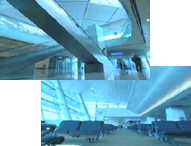 |
The construction of this new
terminal and car park was started on 17th of February 1998 and was completed in
only 22 ½ months. The terminal, which can handle passengers of 30 planes
simultaneously and capable of serving 18 planes at the same time, was built at a
speed of 33 thousand square meters of construction per month which is equivalent
to constructing a five-star hotel each month.
The total cost of the project is 306 million dollars with 3500 workers and 356
engineers working in shifts during the materialisation of the project.
Construction of an overnight stay hotel is a part of the growth plan and work is
underway concerning it.
The terminal building has 3
floors; namely the Departure Floor, the Arrival Floor and the Service Floor. There are 160 check-in counters at 5 locations
and 64 of these belong to Turkish Airlines (THY) - Turk Hava Yollari in Turkish.
The 12 entrance gates are equipped with 34 x-ray machines and 35 gate detectors.
There are 64 passport control desks in order to prevent queues.
|
|
The Ataturk International
Airport Terminal is one of the few airports in the world that operates on the
basis of a common database. The automation system set up in the new
International Terminal enables the use of an "Total Airport Management System"
within the airport.
For more information about the
Ataturk International Airport, flight information, hotels near by,
transportation from the airport to your hotel, rent a car facilities in the
airport, car park and its fees, conference rooms available, medical services at
the airport,
shopping facilities, food and beverage facilities, weather information, airport
maps and other services visit
www.ataturkairport.com
|
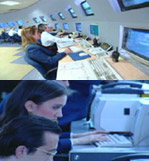 |
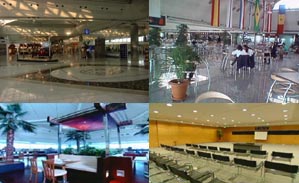 |
The airline companies and Tourism acents in
the Ataturk International Airport building are as follows: Air Anatolia, Alitalia, An Express, Air
Moldova, Austrian Airlines, Air Algerie, Aerolloyd, Air Alfa, Air France,
AOG, Azerbaijan, Aqua Trans, Balkan, British Airways, Casio Airlines, Cathay
Pasific, Cresta, Czech Airlines, Delta Airlines, Egypt Air, El-Al, Emirates,
Fly Air, Gozen Aviation, Gulf Air, Hapag-Llyod, Iran Air, Iberia, Japan
Airlines, KLM, Kuwait Airways, KTHY meaning Kibris Turk Hava Yollari (Cyprus
Turkish Airlines), Kazakistan, Lufthansa, Lot Polish, Malev, Malaysia,
Middle East, MNG, Mohican, Olympic, Onur Air, Oger Tours, Uzbekistan,
Pakistan, Pegasus, Royal Jordanian, Sabena - Swiss Air, Saudi Arabian
Airlines, Singapore, Sudan Airlines, Sryian Airlines, Trek, Tunusia and
Yugoslav Airlines.
|
Together with some private
airlines, Turkish Airlines (THY) has both international and domestic flights network
that you can use conveniently, covering these
seventeen Turkish airports, the first five of which are also international:
Istanbul, Izmir, Ankara,
Dalaman, Antalya, Adana, Bursa, Denizli, Kayseri, Samsun, Erzurum, Erzincan,
Malatya, Diyarbakir, Urfa, Elazig, Kars, Van.
Domestic fares are quite reasonable
with THY in price. It has one of the newest fleets of aircraft and is among the
youngest airlines in the world. For more information about Turkish Airlines
(THY) visit
www.turkhavayollari.com.tr and choose English.
The telephone number for Ataturk
International Airport's operator is +90 (212) 663 2550, you can also find
telephone numbers of the above airlines at
www.ataturkairport.com look for the phone numbers link there.
Sea Transport:
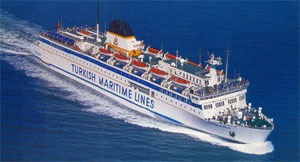 |
As a country surrounded by
sea on three sides Turkey should have been using much more sea
transportation but except for a few routes, sea transportation is not very
common. Turkish Maritime Lines is operating in Adriatic routes & cruises,
domestic routes from Istanbul to the
Black Sea, Marmara Sea, Aegean Sea and the Mediterranean Sea.
Turkish Maritime Organization was first established in 1843 and is the biggest maritime company in Turkey.
Operating in both domestic and international ferry & passenger services, Turkish
Maritime Organization (T.M.O) owns major ports of Turkey.
|
The ports TMO owns are Istanbul Port, Trabzon Port, Gökçeada_Ugurlu Port, Kabatepe Port, Çesme Port, Dikili Port,
Güllük Port, Kuşadasi Port. Other T.M.O. ports like Antalya, Alanya, Giresun,
Ordu, Hopa, Marmaris, Tekirdag, Sinop and Rize ports have been privatized by the
transfer of management rights method, for 30 years.
|
TMO also provides the following
services:
-
Provides ship
building and repairing services
-
Subsidaries:
Marmara Inc. fully owned by T.M.O. is an international freight forwarder,
specialized in the movement of cargos of all descriptions and sizes on a
worldwide scale
-
Joint Ventures:
Mesbaş - Mersin Free Trade Zone
-
Port Managements
|

Sign of TMO |
It has agencies in France,
Belgium, England, Germany, Italy and in Turkish Republic of Northern Cyprus (TRNC
or KKTC - Kuzey Kibris Turk Cumhuriyeti in Turkish).
For more information about
Turkish Maritime Organization (Turkiye Denizcilik Isletmeleri in Turkish), and
to buy online tickets visit
http://www.tdi.com.tr and choose your own language from there.
Rail
Transport:
Turkey's railway system
extends approximately 10,922 km of which 2,300 km/1,430 miles is within the framework of the International Main Railways
European Charter and the Trans-European Railways (TER).
|
Turkish Republic State Railways
(TCDD - Turkiye Cumhuriyeti Devlet Demiryollari in Turkish) employs 47,212
workers and the General Directorate replaces 300500 km / 185310 miles of
track each year. During recent years the
Turkish Government has spent a considerable amount of money in improving the
rolling stock and equipment of the countrys rail-network.
There are 58 steam, 554
diesel and 58 electric locomotives in operation. 12% of the railways work on
electricity and the remaining 88% are diesel. The number of passengers
travelling by train per year is around 85 million, the amount of freight
transported is 10 million tons approx. |

(The sign of Turkish
Republic State Railways)
|
Between Turkey and Europe
Bosfor Express works everyday.
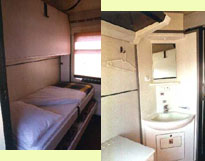
(The Couchette with sheets) |
Operating mainly in the
central Turkey between Ankara and Istanbul and a few other routes extending
to the eastern and south-eastern Anatolia which provide comfort under severe
climatic conditions, travelling by train is not usually preferred with in
the country and the number of passengers decreases every year, although
travelling by train is safer and several trains are faster and as
comfortable as the best of the long-distance coaches on the same routes.
Frequent services,
including an excellent night train with sleeping berths and reclining seats,
link Istanbul and Ankara. TCDD sells discounted tickets to groups of 24 or
more and to purchasers of return tickets. |
|
Trains from Ankara to
Istanbul all arrive in Istanbul at Haydarpasha Train Station on the Asian side of the Bosphorus. Best
train, really first class, is the Baskent Ekspresi, same class
the Fatih Ekspresi, travel time a bit more than seven hours.
Mavi tren, comfortable, travel time around 8 hours. Also two night trains
are running. |
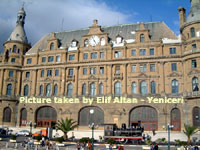
(Haydarpasha Train
Station) |
"Couchette with sheets" is for those who
prefer to get a nice rest and sleep during the trip. The Passengers travel alone
or share the compartment with another person which has two berths with sheets,
quilting and pillows and blankets and are attended by sleeping car staff.
|
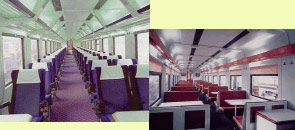 |
The new express routes are
the
"Erzurum Ekspresi", travels between Ankara-Erzurum everyday
and the "Cumhuriyet Ekspresi", travelling between
Ankara-Istanbul (Haydarpasa Train Station) everyday. These routes are put
into service starting from 29 October, 2002.
You can choose to travel in
trains with "The Pullman Couch" without compartments in leaning seats
which are comfortable.
|
For more information on TCDD visit
www.tcdd.gov.tr and choose
English.
To check trains time
tables visit
www.tcdd.gov.tr/tcddwebenglish/trainstation.html
To check prices visit
www.tcdd.gov.tr/tcddwebenglish/mainlinefares.html
Bus
Transport:
With a network of 63,156km
(2002) of roads, most of the Turkish people prefer to use bus on their
intercity journeys. Turkey has excellent bus services. Many of
the luxurious buses are manufactured in Turkey, therefore the number of
buses is comparatively high. There are also a lot of buses of German
manufacture in use; Mercedes and MAN predominate. The ratio is 25 people per one public vehicle.
|
Because of the big competition among the
private bus companies, the quality of services are high as well. In some destinations,
services provided are as frequent as in airlines with snacks, refreshments,
and they frequently serve eau-de-Cologne to fresh you on board. Almost all
of buses have air-conditioning installed, but it is not unusual for some
passengers who are sensitive to draughts, to ask to have it turned off and
the roof vents closed.
Ticket prices are very
cheap if you use buses. The biggest bus companies are Kamil Koc Turizm, Pamukkale Turizm,
Ulusoy and Varan
Turizm but there are many many more.
Journeys on these may cost a little bit more, but the additional comfort which
they offer and the provision of light refreshments during the journey, and
most importantly the safety issues they care about is more than to justify
the additional expense because accident rates on roads are higher
especially on holidays as a result of high number of people choosing to
travel by road and some cheaper bus companies hire uneducated bus drivers.
|
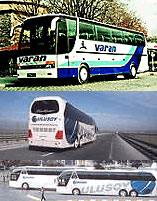 |
Throughout Turkey, long-distance
bus services start from the otogar, which is usually located on the
outskirts of towns. There is often a courtesy minibus which will take
passengers from the companys town office and sometimes from the hotels to
the otogar. If you wish to avoid transferring from one vehicle to another as
much as possible, and if you believe in the idea that safety comes first,
don't use the cheaper companies but select between the ones I mentioned
above.
The international and inter-city bus station
in Istanbul on the Europe side is at Esenler. You can just say Otogar. This Otogar is
very big with ticketing and booking offices, places to eat, and shops. Bus
companies also have ticket and booking offices in areas of Taksim and Sultanahmet. Esenler bus station can
be reached by
tramway.
The
inter-city bus station in the Anatolian side is at Harem. This bus station is much smaller than the Esenler
bus station but can be handy when travelling to the east. It might save you the time to cross
one of the Bosphorus bridges. Harem's bus station can easily be reached by
ferry from Eminonu.
Long-distance buses
usually stop about every two hours for approximately 30 minutes on their way to
the destination at places called
"Dinlenme Tesisi" meaning resting establishment in English that consists of restaurants,
toilets and sometimes shops that sell local souvenirs. But if still you think you can easily become travel-sick, get proprietary medicines
that can be used without prescription. This will help combating travel sickness. Turkish drugstores
are called "Eczane".
On a
night-journey from the Aegean or Mediterranean coast to the central Turkey
(Anatolia), take
some warm clothes, as even during the summer, the temperature on the
Anatolian plateau drops sharply after sun goes down. Turks are very social and
friendly people so, passengers might attempt to
chat with you and they will most likely offer tea or
other refreshments to you as well. These long-distance bus
journeys will offer you an opportunity to experience an aspect of
Turkish life, culture and to see Turkey in a deeper aspect which is missed
by travellers who stick to organised tours.
Long distance bus journeys
are my own favourite way of travelling, although they can be tiring. I
travelled a lot by using bus around Turkey since I was a child and can
recommend it to anyone who loves long travels and country side. Just don't
forget your favourite book and walkman.
For more information about road
network and conditions, maps, motorways, bridges, distances, traffic conditions,
traffic safety project and reports you can visit the web site of General
Directorate of Highways (Karayollari Genel Mudurlugu) in
Turkey. Click here
www.kgm.gov.tr and choose English.
 Top
Top









